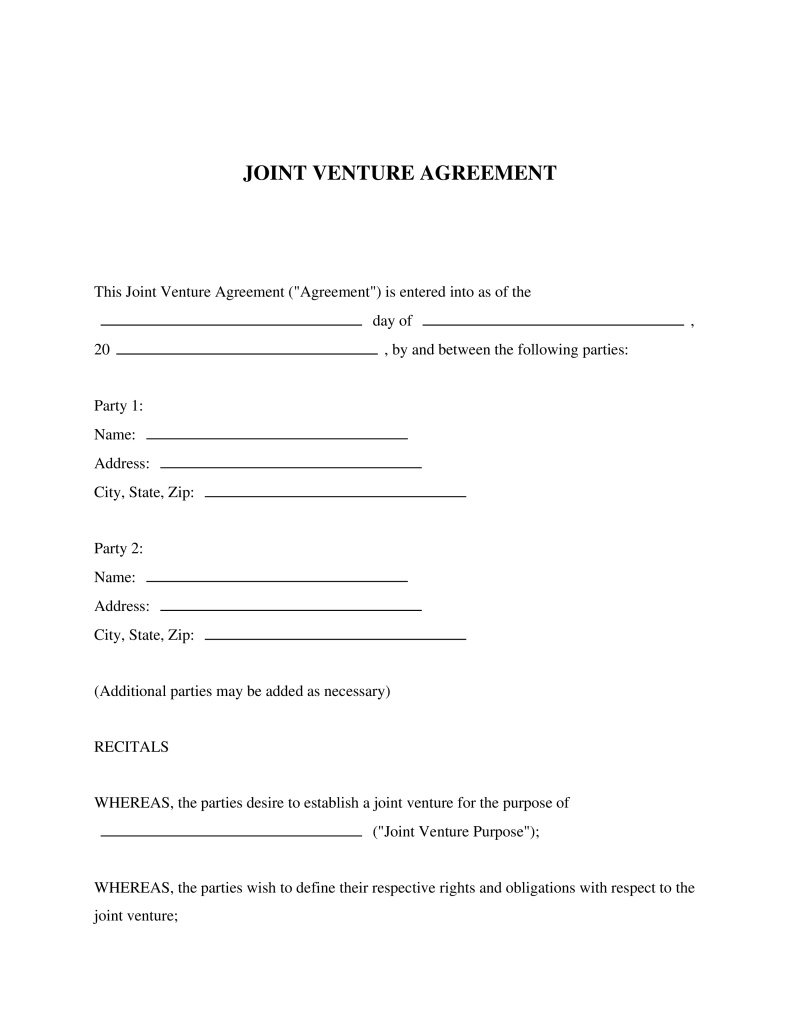A Joint Venture Agreement outlines the terms and conditions of a partnership between two or more parties to collaborate on a specific project or business.
Party One Name
Type the full legal name of the first party involved in this agreement. This should include the first name, middle name (if applicable), and last name, without any abbreviations. Providing the correct name is important because it ensures that all parties are properly identified and legally bound by this document.

Table of Contents
What is a Joint Venture Agreement?
A Joint Venture Agreement is a legal document that formalizes the partnership between two or more parties who agree to undertake a specific business venture together. This document delineates the terms and conditions under which the joint venture (JV) will operate, including profit sharing, responsibilities, and governance structures. It serves as a critical tool for entities looking to combine resources, expertise, or markets to pursue mutual business objectives. Entrepreneurs, corporations, and small businesses alike may find this agreement essential when they seek to expand their capabilities without the formalities of merging companies or creating a new entity altogether. The primary purpose of this agreement is to ensure clarity and prevent disputes by explicitly stating each party's contributions and entitlements.
Key Features
Important Provisions
- Definition of Joint Venture: Clarifies what constitutes the JV, its purpose, and its operational scope.
- Capital Contributions: Details each party's financial investment into the venture, including any non-monetary assets provided as capital.
- Profit Sharing: Specifies how profits (and losses) will be divided among the JV partners.
- Management Structure: Outlines how decisions will be made within the JV, including voting rights and responsibilities of each member.
- Termination Conditions: Describes under what circumstances the JV can be dissolved, including exit strategies for all parties.
Pros and Cons
Pros
- +Facilitates strategic partnerships by clearly defining terms of cooperation.
- +Minimizes legal risks through comprehensive documentation of agreements.
- +Promotes efficiency by detailing governance structures and operational protocols.
- +Enhances flexibility in pursuing new business opportunities with different partners.
- +Strengthens relationships between parties with shared objectives by setting clear expectations.
Cons
- -May require significant negotiation time to address all parties' interests adequately.
- -Could be perceived as less binding than forming a new company or corporate merger, potentially affecting commitment levels.
- -Requires regular review and possible amendment as the JV evolves or market conditions change.
Common Uses
- Launching a new product or service that combines the expertise or resources of two companies.
- Entering new geographical markets where one party has existing infrastructure or regulatory approvals.
- Combining technological assets for research and development projects.
- Pooling resources for large-scale investments or construction projects.
- Collaborating on marketing efforts to leverage each party's brand recognition.
- Sharing facilities or manufacturing capabilities to reduce costs.
Frequently Asked Questions
Do you have a question about a Joint Venture Agreement?
Example questions:
Not the form you're looking for?
Try our legal document generator to create a custom document
Community Discussion
Share your experience and help others
Legal Notice: Comments are personal opinions and do not constitute legal advice. Always consult a qualified attorney for matters specific to your situation.
Comments (0)
Leave a Comment
No comments yet. Be the first to comment!